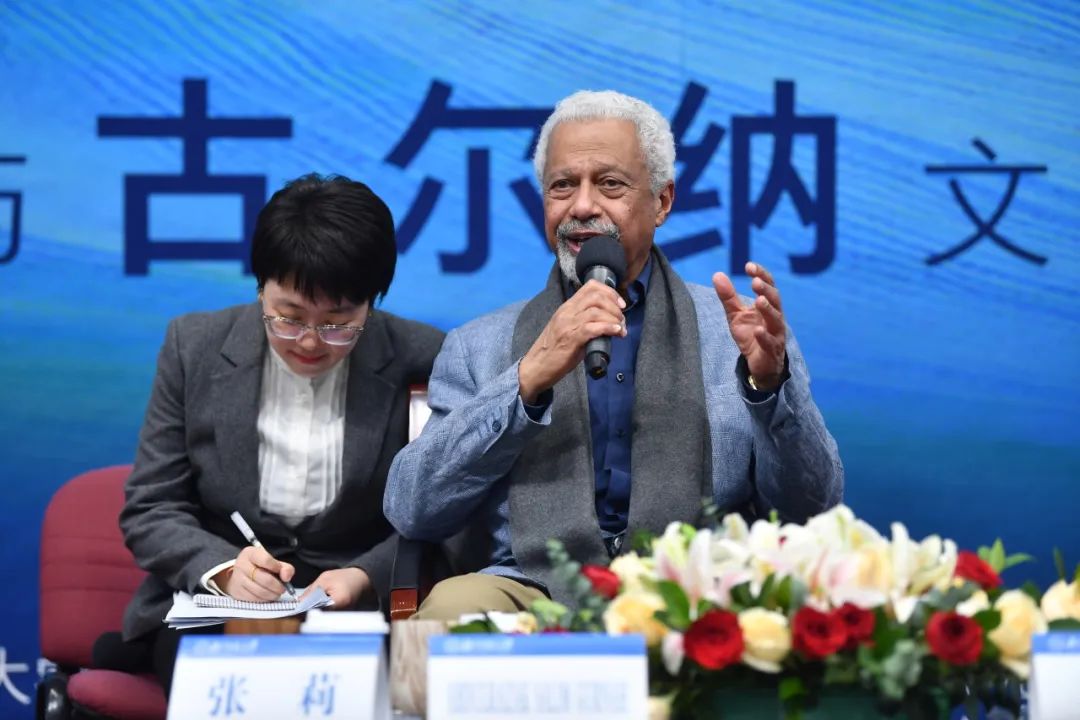A Dialogue Between Mo Yan and Gurnah,Two Nobel Literature Laureates
On March 11, Gurnah, the 2021 Nobel Literature Prize winner, came to BNU to have a talk about literature with Mo Yan, the professor of BNU and the 2012 Nobel Literature Prize winner.

The Hometown and Foreign Land in Literature
Mo Yan’s depiction of Gaomi and Gurnah’s portrayal of Zanzibar both present their infinite attachment to their hometown and constant reflection on the world, giving birth to many stories filled with allegory and a sense of destiny.
For Gurner, Africa is “hometown”, while for Mo Yan, it is “a foreign land”.
Mo Yan recalled the scenes of the African savannah he witnessed during his field trip in Africa, and thought of Hemingway’s work The Snows of Kilimanjaro. He believed that the “Africa of literature” he understood from works is greatly different from the “Africa of reality” he saw. For Gurnah, Africa holds different memories. He mentioned that the island of Zanzibar has vast beaches. “Our beaches, in a sense, are connecting with the world and carrying the cross-oceanic exchanges with other cultures of the world.”
Gurna said that home and hometown are not only geographical concepts, but also emotional resonances deep in the heart. Mo Yan added that the writer’s experiences of creation extend and their range of activity expands, everywhere in the world can be the writer’s “hometown.”

Gurneh also talked about his reading of Mo Yan’s Red Sorghum , expressed his affection for the language, narrative style and “breath” of this work conveys, and praised Mo Yan'’s novels for the outstanding depiction the experiences of ordinary people in the historical contexts in a way that is tangible and relatable to readers.
From the perspective of “storytelling”, Mo Yan said that a writer's writing cannot be separated from his hometown. He believed that a novelist’s autobiography is often reflected in all his works and may contain elements of fiction, but a novelist’s novels are definitely contain a lot of autobiographical content. This is not a matter of honesty, but purelya matter of art. He also talked about Gurnah’s Desertion, suggesting that novelists will not describe a massive change in an all-round way as the historian does, but “see the big through the small” and come into an open world through a narrow door.
“The Novelist’s Second Identity”

In addition to being a novelist, the two Nobel laureates also have another identity. Gurnah is an important scholar in the fields of African literature, colonial literature and post-colonial literature, and Mo Yan is a playwriter. Both writers also shared their experiences about their second identities.
Gurnah said that both academic research and literary creation are his aspirations. and there is no difficulty in balancing the two. When writing academic monographs and papers, he will use academic language, rich supporting materials, and an authoritative tone to cover as comprehensive as possible; when writing novels, he is completely free.
Mo Yan also introduced his original intentions and insights in creating dramas. He visited Shakespeare’s Birthplace three times and discovered a peony pavilion in Stratford’s Firs Garden. Shakespeare and Tang Xianzu were great dramatists from the East and the West at the same era. The love in the drama The Peony Pavilion broke through the boundaries between life and death, as did Shakespeare’s Romeo and Juliet. From this, he felt that the great writers captured the deep connection of human emotions.
The Novelist on Teaching Creative Writing

At the end of the talk, the two Nobel Prize winners talked about the teaching of creative writing.
Mo Yan said that BNU has accumulated valuable experience in writing teaching over the years. Students here have published excellent works in many top literary journals. The International Center for Writing has set up a creative writing workshop and organizes rewriting sessions, inviting critics, writers and editors to discuss students’ works, which can continuously cultivate writers for the literature. He believes that the dream of “BNU Writers Group” will come into reality.
Gurnah said that many schools in the UK offer creative writing courses, with enrollment significantly exceeding capacity, which shows students’s love for creative writing. Based on his own writing experience, Gurnah suggested that beginners need to learn and explore by themselves. After writing, they should ask others to read it as much as possible so as to understand the readers’ opinions. He believes that creative writing courses are quite valuable and the school should encourage students, helping them find the right direction for their writing, and teach them how to be known, understood and appreciated by readers.


